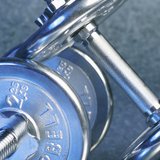Vegetarianism and the Athlete
By: Rocco Boulay, CSCS & Christopher Saficci Ph.D.
The effectiveness of a vegetarian’s diet during athletic performance is often misjudged and a debatable topic. The number of elite athletes following a true vegetarian diet is small, but is continuing to grow. One would naturally think a vegetarian would lack protein and other vital nutrients while performing, but this can be a misconception depending on what type of vegetarian the athlete is. Even though studies have failed to see a true benefit of a vegetarian diet on exercise performance, vegetarian athletes can perform just as well as non-vegetarian athletes, and may even be considerably higher.
Vegetarianism is more than a diet; it is a lifestyle, a state of mind, and a set of values that are unique to each individual. One can say this because you simply cannot take a piece of meat off your plate to guarantee health. When you take meat out of your everyday meals, you need healthy alternatives to replace it. When healthy balanced choices are made, the vegetarian diet can easily meet the nutritional needs for any lifestyle or sport (Paul, 1989). Because of this, athletes are beginning to seek the vegetarian alternative. Depending on the type of vegetarian diet, vegetarians can meet the nutritional needs for any high performance sport. Many studies have also shown that vegetarianism can play a major role in disease prevention (Barnard, et al., 1995). Others may be vegetarians for cultural and religious beliefs or animal-rights and environmental issues, all of which should be respected.
When discussing vegetarian diets, it is important to explain some of the different types of diets athletes prefer. Lacto-ovo-vegetarians are the most common; “lacto” and “ovo” referring to eating dairy products and eggs. These are people who do not eat any type of meat, seafood, or animal flesh of any kind. Instead they substitute eggs and dairy into their diet. These vegetarians generally do not have nutritional deficiencies, because dairy products good sources of complete protein, calcium, vitamin D, and vitamin B-12, all things of which people are usually cautious of vegetarianism (Venderly & Campbell, 2006).
Pescatarian’s are very similar to lacto-ovo-vegetarians with the exception of fish. This type of vegetarianism is becoming more common, mainly for health reasoning or a stepping-stone to become a full vegetarian. Other athletes may choose to be macrobiotic vegetarians, which include unprocessed vegan foods (such as fruits and vegetables) and allows the sporadic consumption of fish. These vegetarians try to avoid sugars and refined oils, but they like to indulge in Asian vegetables and sea vegetables (American Dietetic Association, 2009). All the types of vegetarian diets listed so far are considered to be rather healthy in athletes and minimal problems, if any, occur if approached correctly.
There are a variety of vegetarian diets, but some researchers declare vegan’s as the only “true vegetarians” (Laquale, 2006). Vegans consume plant products and avoid all foods of animal origin and their derivatives such as gelatin, stocks and bases (Fontana, et al., 2006). This includes food items like egg-by-products, sauces made of butter or cream, white cane sugar and sometimes even soy, which is usually a meat alternative for vegetarian diets.
Vegetarian or near vegetarian diets are common among certain groups of athletes. High carbohydrate diets are rather popular among endurance athletes such as distance runners and tri-athletes. These athletes typically exclude red meat from their diet because they believe it is high in fat and cholesterol (Cox, 2001). Instead, endurance athletes are fonder of high carbohydrate diets while maintaining low body weight and body fat.
Potential Issues to be considered
As stated, if a vegetarian diet is not planned correctly, there can be some problems and nutritional deficiencies. These nutritional deficiencies can cause a variety of health problems, rather than benefits. The vegetarian diet can be deficient in fat, protein, iron, zinc, calcium, vitamin B12, and vitamin D (Ferdowsian, et al., 2010). Because of malnutrition and tissue breakdown, the nervous system suffers bringing out symptoms such as moodiness and depression. Other consequences of an inadequate vegetarian diet are anemia, osteoporosis, muscle cramping and amenorrhea.
A common vegetarian deficiency, amenorrhea, is caused by a hormonal dysfunction that results in low estrogen levels or an absence of menstruation in women. Prolactin levels are also seen to be lower in amenorrhea athletes, which are concerns in adolescent girls, according to Paul, (1989). During the adolescent years, bones are developing in length and density. If adolescent girls are associated with amenorrhea, it can lead to bone loss and osteoporosis. Studies have shown that female athletes; runners, swimmers, and cyclists had the highest rates of amenorrhea. Researchers are not sure why amenorrhea and irregular menstrual cycles are common among vegetarians compared to non-vegetarians. Other researchers discuss that vegetarianism and amenorrhea were not related among athletic and non-athletic vegetarians (Larson-Meyer, 2009). Many studies infer that there were no differences in menstrual irregularities among female lacto-ovo-vegetarians and non-vegetarian athletes. At this point, it would seem that vegan or near vegan diets are more likely to have health problems and deficiencies. There is obviously more research to be done, but scientists continue to search for the long-term effects of vegetarian female athletes.
Because of the continual questioning of amenorrhea in vegetarian female athletes, scholars are beginning to link eating disorders in this scenario. Numerous studies have suggested many individuals with an eating disorder; consider themselves vegetarians, regardless of whether they consider themselves athletes or non-athletes. Some suggest that athletes “cover up” their eating disorder by claiming themselves as vegetarians. These athletes with eating disorders related vegetarian diets and intense prolonged exercise to no fat diets and sports that emphasize thinness and increased caloric expenditure (Buchholz & Schoeller, 2004). Athletes with eating disorders often struggle with self-esteem and body image, inability to feel hunger sensations, unrealistic expectations, and have an extreme obsession with body weight and food consumption. Adopting a vegetarian diet does not lead to eating disorders; to a certain extent, a vegetarian diet might be selected by an athlete or individual to mask an existing disorder (Stephens, et al., 2011).
Many people automatically assume vegetarians do not get enough protein without eating meats. This is a common misconception in society, because one usually thinks of meat, mainly as a sufficient protein source. Protein is an important macronutrient during performance, because the delivery of a protein source aids in repairing and rebuilding metabolism, especially as exercise becomes more prolonged and strenuous. The American Dietetic Association (1997) states, “A vegetarian diet can provide adequate protein without the use of supplements or special foods if daily energy demands of the athlete are met.
Specific Athletic Demands
The recommended dietary allowance for protein is 0.8g protein/kg* day for healthy adults. Some studies debate this statistic, because they believe more protein is necessary in athletes as an energy source during exercise. Researchers may suggest this primarily for highly trained, elite athletes (Venderly & Campbell, 2006). There is little scientific support for recreational and non-elite athletes to consume more protein than sedentary individuals. A vegetarian diet is able to supply all essential and non-essential amino acids from plant foods alone if a variety of these foods are consumed over the course of a day and the energy intake is adequate. Egg, dairy, and soy are all of high quantity in protein and provide the essential amino acids for protein synthesis. Other sources of protein for a vegetarian diet include: legumes, dried beans, peas and nuts (Nieman, 1999). These plant-based proteins do not contain all the essential proteins and are therefore considered incomplete. Eating a variety of these types of plant-based foods throughout the day adequately provide all the essential amino acids that are provided by the proteins in meat, eggs and dairy products.
Along with the worry of inadequate protein, energy levels are also looked upon carefully in vegetarians. An athlete typically has higher caloric needs because of the increased demands of physical activity (Venderly & Campbell, 2006). The typical demands for energy needs may range from 2000 to 6000 kcal/day or more, ultimately depending on the athlete’s body size, composition, gender, training programs, and type/intensity of the sport they are performing. Vegetarian or near vegetarian diets are capable of providing sufficient energy to meet the demand of the athletes. On the other hand, it is harder for a vegan to meet sufficient energy needs and is often a challenge. The vegan diet consists of food choices with lower energy density such as lower fat and high fiber. This is important to examine because high fiber diets may slightly decrease energy availability due to a reduction in metabolism energy (Buchholz & Schoeller, 2004). Overall, many respected organizations emphasize that vegetarians must consume sufficient energy to support optimal performance, lean tissue maintenance and proper immune system functions.
Another inadequacy vegetarians may come across is low iron. Recent studies have reported lower iron levels in non-athlete male and female vegetarians than in non-vegetarians, despite similar or higher iron intakes (Larson-Meyer, 2006). This inadequacy may be a result of the lack of heme iron contained in meats vs. the non-heme iron found in plant sources. The body easily absorbs heme iron while the non-heme variety found in plants is not well absorbed. The RDA for iron is 14 milligrams per day for vegetarian men and for women post-menopausal, and 33 milligrams per day for women prior to menopause (American Dietetic Association, 2009).
Because athletes have increased iron requirements, it is rather unclear whether vegetarian diets can provide sufficient iron. However, iron deficiency anemia may be a detriment to performance, since iron is critical in oxidative energy metabolism, but this result is rare in vegetarian athletes. Athletes who usually require higher iron intake are typically; females and distance runners. It is crucial to note that even though vegetarian athletes require more amounts of iron, the abundance of iron inhibitors such as phytates and tannins naturally occur in plant foods. Acid pump inhibitors for instance the drug Prilosec also contributes to poor iron absorption. In positive respects, vegetarian diets are usually high in vitamin C and citric acid, which negates the effects of iron inhibitors (Cox, 2001).
Other nutrient deficiencies found in vegetarian athletes include calcium, zinc, vitamin B-12, and riboflavin. Most lacto-ovo-vegetarians do not fall into these deficiencies, where it is seen as more of a challenge for vegan diets. However, most meat alternatives such as soy products, legumes, nuts and eggs can be sufficient for a vegetarian athlete depending on their nutrient intake, lifestyle and athletic event.
There is often a question if vegetarians could benefit from creatine loading. Usually vegetarians are shown to have lower body creatine pools than non-vegetarians (Nieman, 1999). Creatine has possible effects on enhancing exercise performance and body composition changes with training. The prevalence of data supports creatine supplements as ergogenic, especially for short term, high intensity exercise (Stephens, et al., 2011). The basic role creatine plays on the body is in energy metabolism. It supplies the ATP-CP system with the phosphate molecule that is needed to transform ADP (Adenosine Diphosphate) back to ATP (Adenosine Triphosphate) (ADP + P = ATP). More than 90% of the total body pool of creatine is located in skeletal muscle where it primarily exists as free creatine and creatine phosphate. Creatine definitely has benefits but can also have negative effects on the body. Because creatine mostly makes up water in skeletal muscle (instead of building fibers), one’s body composition can decrease after creatine is no longer used. Depending on the duration of performance, intensity, and environmental temperature, this could also cause the loss of water in skeletal muscle, therefore decreasing body composition and possibly effecting overall athletic performance. However, the use of creatine is still a debatable supplement that is used by many athletes.
Strength training however may pose a challenge to the vegetarian athlete. Due to the catabolic nature of resistive exercise (the breaking down of muscle fibers in particular) an athlete’s requirement for complete proteins is vital. During resistance training, such as weight lifting, the athlete’s muscle fibers are exposed to external forces that create minute tears in the trained muscles. Post exercise, these muscle fibers, through the body’s adaptation phase may need an additional amount of amino acids via proteins to rebuild the trained musculature. This is the anabolic phase of recovery in all animal species. The vegetarian athlete may consider their options for complete proteins and could track the effectiveness of their diet by monitoring their lean mass. If lean mass is compromised through training the vegetarian athlete may want to counsel with a nutrition specialist to adjust alternative energy requirements.
Conclusion
Altogether, when an athlete chooses to pursue a vegetarian diet, precautions should be taken, and the athlete’s reasoning must be clarified. It may seem necessary to do this so one can determine the adequacy of their overall energy demands and nutrient intake. Those vegetarians who decide to restrict meat or limit dairy food intakes in order to avoid fat and cholesterol and manage body weight should be referred to a sports dietician for appropriate nutritional advice. It is also important for athletes that have recently become vegetarian to discuss weight history in order to assess the energy adequacy of their diet. In some cases it may be difficult for an individual to maintain their previous energy requirements if their new diet consists more of high fiber, nutritious carbohydrate foods. There are foods especially for lacto-ovo-vegetarians that are low in bulk and energy dense such as low fat milk, reduced fat cheese and other low fat dairy products. The majority of opinions seem to indicate that athletic performance is neither compromised nor enhanced by habitually eating vegetarian diet, when specific athletic needs are controlled.
Bookmark & Share
User Comments
Be the first to comment on this post below!
Previous Article
Next Article
Most Popular Articles
- Kim's Weight Loss Journey with Integrity Health Coaching Fitness Centers & Gyms in NH
- Store Special April 2 - 7
- SAVE THE DATE & REGISTER!! - TEAM INTEGRITY
- Maple Avocado Coconut Smoothie
- Almond Encrusted Chicken
- At Integrity Health & Fitness Coaching Centers, we are about lasting CHANGE.
- October Fitness Challenge
- Stuck in a Funk?
About Integrity
Integrity Health is a franchise company residing in New Hampshire. We specialize in health coaching centers combining fitness with weight loss to optimize and promote optimal health. We are also the national purveyors of the RAMP Metabolic Fitness Prescription licensed by fitness professionals.
HEALTH COACHING LOCATIONS

491 Main Street
Gorham, NH 03581

1857 White Mountain Highway
North Conway NH 03860

Solutions For Fitness Centers

